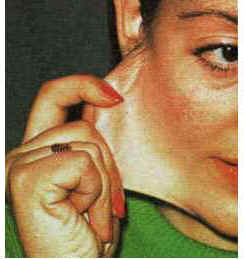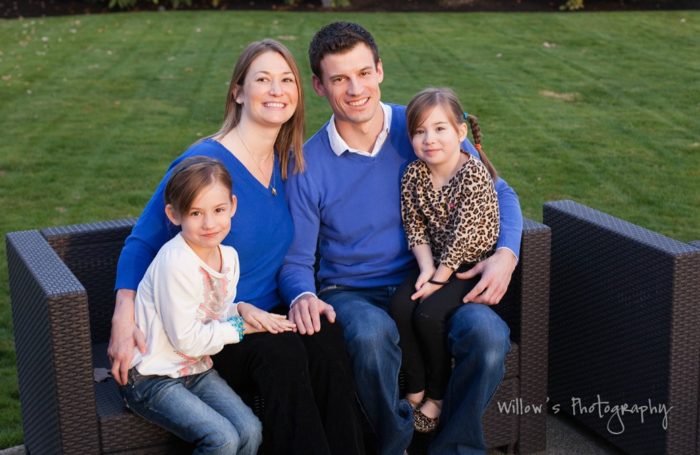 This is one of many ‘True Story’ interviews in which we talk to people who have experienced interesting/amazing/challenging things. This is the story of my fantastic friend Jess and her genetically inherited super-stretchy body!
This is one of many ‘True Story’ interviews in which we talk to people who have experienced interesting/amazing/challenging things. This is the story of my fantastic friend Jess and her genetically inherited super-stretchy body!
I’m from Minnesota, currently living in Boulder, CO, where I’m a grad student in museum studies. When I’m not talking to third-graders about dinosaurs (best job ever!), I like funny movies, pub trivia, and taking advantage of Colorado’s many excellent beers.Can you tell us about your disorder?
I have a genetic disorder called Ehlers-Danlos Syndrome (EDS). It affects collagen, the stuff that makes your skin snap back into place. The Guinness World Record people with the crazy stretchy skin? That’s EDS!There are several types– some can affect internal organs and cause a lot of chronic pain, and I’m lucky not to have anything like that. I have the “classical” type, which affects something like 1 in 20,000-50,000 people. Symptoms of my type are hypermobile (flexible) joints, “velvety” skin that is very stretchy and fragile, tendency to bruise easily, and wounds that split open and leave distinctive “cigarette paper” scars.
I bruise like a peach, and bruises over bony bits like shins, knees, and elbows tend to stick around. Cuts that are any deeper than a scratch will kind of spring open, and if I smack my shin into something hard enough, that can also cause the skin over the bone to split. I’ve had a LOT of stitches, and not for cool got-into-a-bar-fight injuries—for stuff like cat scratches. I have a lot of scars and marks from old bruises.
The stretchy-ness though, is of a pretty fun freak-show quality. I can bend my fingers backwards to touch my hand and pop some joints in and out at will. I can also stretch my skin a good couple of inches off of the back of my hand (and most other places). It’s a hell of a party trick!
How old were you when you were diagnosed? Do other people in your family have it?
I’ve been stretchy and bendy as long as I can remember, but I wasn’t formally diagnosed until I was a teenager. A few people on both sides of my family have claimed to be “double-jointed,” but no one really exhibits the symptoms of EDS, so we’re not really sure where it came from.
How did you feel when you were diagnosed?
With EDS, there are things that don’t seem like they would be connected – for example, I get these little fibroid bumps on my knees and elbows. Turns out those are a really common symptom of my type, so it was actually kind of great to understand that it was all related.
When I was really little, I was tested for leukemia because of the bruising, and the people at my daycare would ask me questions to try to figure out if I was being abused, because I was always coming in with new cuts and bruises. It was hard on my parents, so I think it was also nice for them to have a formal diagnosis after all of that.
Is there any treatment for your disorder?
Not really. I can help stabilize major joints with weight training to build up the muscles, but there’s not much I can do for stuff like finger joints. I mostly just try to prevent injuries!
I know you were in a University of Minnesota medical study. Can you tell us about that?
I was referred to a geneticist at the U of M when I was 14. He took one look at my skin, pulled a book of the shelf, and showed me a picture of someone just like me, which was really cool. He was able to tell me things I should be worried about and things that I would have thought might be a problem, like arthritis or pregnancy (both should just be normal risks for me).
He also called in all the nurses and students for a little show, which is actually a very common doctor’s office experience for me! I always have to tell new doctors/dentists about it, and it’s rare enough that almost none have seen it in person. My first visit to a new clinic is often a little demo for whatever doctors and nurses are around, but as a science nerd myself, I totally get it, and it doesn’t bother me.
Does your disorder affect your every day life?
Most of the time, it’s not a problem for me at all. I’m lucky in that my type is not particularly debilitating, but I do have to be pretty careful with myself, and that has definitely shaped my personality. I’m very cautious, because a small injury can be a big problem for me. Sometimes people think I’m being overcautious, and that’s hard. When I was in school, my mom would always have to write a note to my gym teacher saying that I’m not just a total baby—injuries really will affect me differently, and please let me go to the nurse if I say I need to. It can suck to feel like you can’t trust your body in ways that other people think nothing of.
On the other hand, it is a rad party trick! People are generally grossed out/fascinated by it, but no one has ever been a jerk about it. Most people think it’s pretty cool.
How likely is it that your kids will inherit your disorder? Is that something that concerns you?
EDS is a dominant gene, so there’s a 50/50 chance my kids would inherit it. I’m not a parent, but I think it’s pretty much the rule that you’re always worried about your kids getting messed up. At least with EDS, I would know it might be coming, and know what to watch for from the start.
Any questions for Jess? Do you have any genetically inherited oddities? My grandpa, dad and I all have crooked pinkies!












This may be a rude question but I'm just too curious to not ask. I'm sorry if it offends you.
Does EDS have any effect on how wrinkly you'll get when you grow old? As far as I know, wrinkles are connected with the loss of elasticity in the skin… Would EDS make you one of those wrinkle-free grandmothers (or general old ladies if you don't have children/grandchildren)?
really touching!
I also have EDS. But I have a mix of Hyper-Mobile, Classic, and Vascular. I wasn't diagnosed until I was 33 by a geneticist at the University of Iowa. I don't have the stretchy skin but my brother does! We were adopted into the same family as kids. He's never been formally diagnosed but I'm sure he has EDS!
Suzanne
AKA
@MeriLizzie
EDS runs in my family. My mother has fairly stretchy skin, and she and all her sisters all can bend over and put both palms flat on the floor (and they're 50+!). I can pull my fingers out of their sockets (used to do it as a kid in school while fidgeting, never realized it wasn't normal) and I always have strange bruises too. Luckily no one in my family has had any of the adverse effects but since my mother was diagnosed with it several years ago, we realized all the females in the family had it.
Thank you so much for contributing this! I also have a mild version of a collagen-related disorder, but it's autoimmune and not genetic (morphea, a type of scleroderma, for the nerds out there). Although it only started developing 6 years ago (age 14) and it doesn't make my skin stretchy (just really weird- and bruised-looking in patches), I related so much to your experience – from being put on display to all the doctors and interns, to getting weird looks and questions about my "bruises," to the frustration of having a disease without a cure – thank you so much for sharing your story, Jess.
Ahhh I remember being diagnoised with Classical EDS when I was a teenager and one of the girls at school telling me I was making it up as her mum, a nurse, had never heard of it.
I find things are slightly better these days but I still have to explain it a lot.
There's not a lot of research being done in the UK, but one of my friends from Uni ended up working for one of two professors researching EDS in the UK. It was really useful to have someone to put stupid questions too as I had been pretty much left to get on with it after my intial diagnosis.
Leena — I actually get quite a few impertinent questions about my sex life (heh heh, are you stretchy…everywhere?) so a wrinkles questions is totally tame!
I think it's a little different, person to person, but according to my doctor (and my normal 30-year-old person's crow's feet), I'll likely wrinkle up pretty much like everyone else!
My Grandfather broke both of his pinkies, on seperate occasions, after my mother was born. When I was born, I had exaclty the same thing. I know its nothing like stretchy skin, but its a genetic oddity. I think its amazing how cool you are with people oggling you at hospitals.
Hi Sarah, long time reader, first time commenter. My comment would be to consider how appropriate it is to label EDS a disorder or an oddity. My suggestion is to label it a "evolutionary novelty." And of course, some of these novelties and their propagation are what made humans what they are today.
I had the pleasure of being in a relationship with someone with EDS. I'll admit that it was difficult for me to appreciate how this condition resulted in her having a different approach to the world than me. In the same way, I am still adjusting to how women view the world (on average, of course) in comparison to men. For example, I have been less fearful of crime than the women I've dated.
I like to push myself and I do take physical risks. Yet, on reflection, I am more impressed with the feats my ex-girlfriend accomplished. She has run distances that her "able-bodied" friends haven't even attempted. She watched over cuddly but unpredictable cats. Deep in the backcountry, we picked ticks off each other's sweaty bodies. At times, things didn't go completely right. One of my favorite Christmas gifts was when she made a first aid kit for us. She had to put aside her dream of becoming a MMA fighter maybe, but she is still a vivacious and adventurous woman for whom I exuded a steady stream of love.
Allison – Just remember that you solely determine what "weird" is. It's just an ingredient in the unique cocktail that is you.
How interesting – Jess, thanks for sharing your story! I went to CU for Museum Studies, too, and I may have even met you on one of your Intro to Museums field trips (Fort Collins Museum & Discovery Science Center?). I know how bangy and bruisey museum work can be, so be careful!